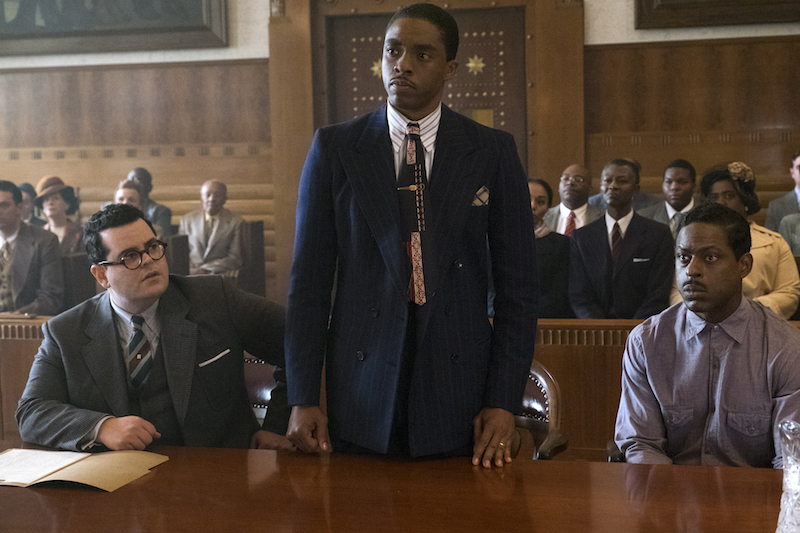
If you’re looking for an incisive examination of how Supreme Court justice Thurgood Marshall grew up, learned to deftly navigate the racial divide, and found his voice as the most powerful civil rights attorney of all time, I suggest you read Ron Cassie’s piece from Baltimore’s August issue. However, if you want an undeniably slick and satisfying courtroom drama/buddy film—albeit one that could also serve to educate those who know little of this chapter in American history—you could do a lot worse than Reginald Hudland’s Marshall.
When the film starts, it’s the early 1940s and young Marshall, played by a dashing Chadwick Boseman, is the NAACP’s top lawyer, often dispatched around the country to take on the most high profile and tricky cases of the day. In Connecticut, a black chauffeur (Sterling K. Brown) has been accused of raping his socialite mistress (Kate Hudson). Marshall is assigned to defend him, but he needs a local lawyer to sponsor him at the trial. Mild-mannered insurance lawyer Sam Friedman (Josh Gad) reluctantly agrees, but there’s a snag: The judge (James Cromwell) says that Marshall can only serve as co-counsel and he can’t speak at the trial. What follows is a kind of courtroom Cyrano de Bergerac, with Marshall feeding Friedman the arguments and rhetoric to use at the trial and Friedman parroting them back to the judge and jury.
Of course, standing up for black men in 1940s America was a dangerous job, but the film seems to suggest that Marshall’s swagger, charisma, and over-powering intellect were such that people were mostly in awe or intimidated by him. That doesn’t mean it was always safe. There is a scene where Marshall reacts to two threatening racist thugs in a bar by extinguishing his cigarette in a glass of whiskey, Dirty Harry-style, and saying, “You gentleman are making a big mistake.” (I confess, I rolled my eyes a bit at that moment.)
One thing I did appreciate about Marshall was how both the judge and the smarmy prosecutor (Dan Stevens) were racist, but in a low-key way. Not every racist wears a white hood. Sometimes the “respectable” racists are even more dangerous—and must be defeated in plain sight. This was one of Marshall’s great gifts, both in the film and in real life.
Mostly, Marshall is a procedural, with Friedman and Marshall investigating the case and coming up with a robust and dramatic defense of their client. It’s funny how, even in 2017, with 80 (or so it sometimes seems) different Law & Order iterations on TV, courtroom dramas can still manage to be engaging.
On top of Boseman’s movie star turn as Marshall, the supporting cast is solid. Gad mostly plays it straight as Friedman, but his natural sweetness comes through, and he has solid chemistry with his co-star. Brown and Hudson embody their complex roles with empathy and conviction. However, brief cameos by Empire’s Jussie Smollett as Langston Hughes and Rozonda “Chilli” Thomas as Zora Neale Hurston are unnecessary and gimmicky.
The real Thurgood Marshall was a great American icon—and one of many reasons I stand a little taller when I say I’m from Baltimore. That being said, I prefer my examinations of great men—great people, for that matter—to show them warts and all. To me, the greatness is elevated when we see their all too relatable flaws, their true humanity (Ava DuVernay’s Selma brilliantly did this in its depiction of Martin Luther King, Jr.). But Marshall isn’t particularly interested in going deep on Thurgood Marshall the man—it’s more about the Marshall, the myth. That said, what it is is just fine—a crowd-pleaser that might encourage people, especially young ones, to learn more about the life of a true American hero.
